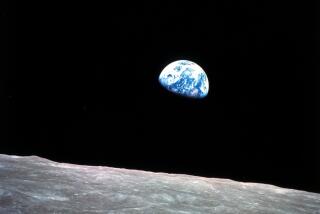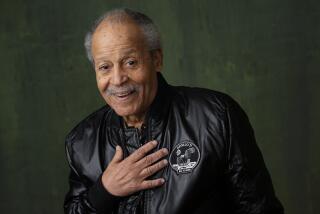For Educator McAuliffe, History Writes and Having Writ, Moves On
- Share via
Sharon Christa McAuliffe, historian, would want it to be recorded that her children, who watched as she died a fiery death, were less than awed by space travel. What impressed Scott, 9, about the Johnson Space Center in Houston was the batting cage down the street. When his mother lifted off, he wanted her to take along his frog.
She would want it to be recorded that when she had asked Caroline, 6, what she liked best at the space center, her daughter singled out the tuna fish in the cafeteria.
She would want it to be recorded that her high school sweetheart, Steven McAuliffe, whom she married 16 years ago and who stood with their children, eyes glued to her rocket ship as it exploded into an orange and white ball of flame in the azure Florida sky, had waited for her patiently as she trained for months on end for her space flight.
Had Husband’s Class Ring
She would want it to be recorded for posterity that Steven had asked her to take along a prized possession--his class ring from the Virginia Military Institute. She could not promise much about her flight, not even that she would return safely. But Christa McAuliffe, as she liked to be called, would want it to be recorded for history that she took the ring.
Christa McAuliffe, 37, killed Tuesday on board the space shuttle Challenger when it blew apart and burned 73 seconds after taking off from the Kennedy Space Center in Florida was much less interested in the large things of history--that she was the first ordinary citizen to be chosen to travel in space; that she had been picked because she was a school teacher; that, in fact, she would go down in history as one of the first Americans to die in space flight.
To McAuliffe, who taught 11th and 12th grade history and other social studies at Concord High School in Concord, N.H., the stuff of value to posterity was of a smaller scale. Social history, it is called. She believed that history unfolds in the lives of ordinary people. Batting cages. Frogs. Tuna fish. Class rings.
Often, she likened her trip into space to the journey of a pioneer woman in a Conestoga wagon--and that was how she planned to teach about her experience in two televised classes from space and in countless interviews and lectures when she returned.
Pioneer women, she once told a magazine reporter, “described things in vivid detail, in word pictures. They were concerned with daily tasks and the interaction between people, with hopes and fears. Those diaries and journals are the richest part of the history of our westward expansion. Without them, it would just be how many Indians were killed and the number of settlements started.
“I’ll be able to take the time to report on feelings and emotions; (about) how it is to live in a close environment with people you don’t really know; housekeeping, weightlessness. A lot of things you kind of wondered (about and) how they did them up there. Eating! Kids may not relate to satellites, but they can relate to breakfast, lunch and dinner.”
She told a TV reporter: “I want to give an ordinary person’s view of space, the idea that there’s a new way of living out there. I mean, there’s going to be space law, there’s going to be business in space and students have to prepare for that future.
“That’s a new world out there, a new frontier, and there are a lot of people we have in our classrooms who will be living and working in space.”
She started a diary. She said she wanted to “bring back the wonder of it all.”
At 8:21 a.m. and 9:51 p.m. PST today, she would have taught two 15-minute lessons from space. Students at her high school and at McCall-Donnelly Elementary School in McCall, Ida., where her backup, Barbara Morgan, teaches, would have been able to ask her questions on a TV hookup. Hundreds of other schools planned to tune in.
She planned to call her first lesson “The Ultimate Field Trip” and her second “Where We’ve Been, Where We’re Going.”
She had enlisted the shuttle crew to help with both.
“The first will be a field trip of the spacecraft,” she said. “I’ll start on the flight deck and tell about life aboard the shuttle. In the second lesson, I’ll start with the Wright brothers and the progress we’ve made and look ahead to the space station.”
Throughout the flight, she intended to participate in demonstration projects to be filmed and shown back on Earth.
Students at Concord High School expected Christa McAuliffe, 128 pounds, 5 feet, 6 inches tall, light brown hair and given to a little black purse slung over one shoulder, to have been a stellar performer in a spacesuit.
Enthusiasm Recalled
“She’s such a dedicated teacher,” said colleague Ron Brown before her flight. “And she’s a very attractive person--visually, vocally. She brings those characteristics to class--her enthusiasm, her excitement.”
When her spaceship exploded, all were stunned: her parents, who were watching; President Reagan, who promised when he was under fire from teacher unions during his reelection campaign that he would send a teacher into space; the 11,000 teachers she beat out for the honor; and the entire nation.
She had known there were risks. But she had said her message to youngsters was: “Go for it.”
And she would want it to be recorded that last summer, when she was at the Johnson Space Center for tests that lasted more than two weeks and daughter Caroline was complaining about her absence, son Scott, then 8, had set his little sister straight:
“Look, Caroline,” a reporter quoted him as saying, “this is a once-in-a-lifetime chance.”
More to Read
Sign up for our Book Club newsletter
Get the latest news, events and more from the Los Angeles Times Book Club, and help us get L.A. reading and talking.
You may occasionally receive promotional content from the Los Angeles Times.









